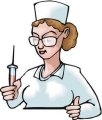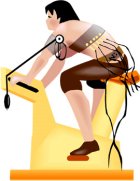
Worksheets and No Prep Teaching Resources
Reading Comprehension Worksheets
Health Professionals

Health Professionals
 Worksheets and No Prep Teaching Resources Reading Comprehension Worksheets Health Professionals |
 Health Professionals |
| edHelper's suggested reading level: | grades 4 to 6 | |
| Flesch-Kincaid grade level: | 9.24 |
|
Cardiologists
By Jennifer Kenny |

|
 1 Renee was a very overweight woman who began experiencing chest pains. She was nervous and went to her regular doctor. He referred her to a special doctor for her heart. What kind of doctor was that? A cardiologist.
1 Renee was a very overweight woman who began experiencing chest pains. She was nervous and went to her regular doctor. He referred her to a special doctor for her heart. What kind of doctor was that? A cardiologist. |
Create Weekly Reading Books
Prepare for an entire week at once! |
| Leave your feedback on Cardiologists (use this link if you found an error in the story) |
 |
Health Professionals
|